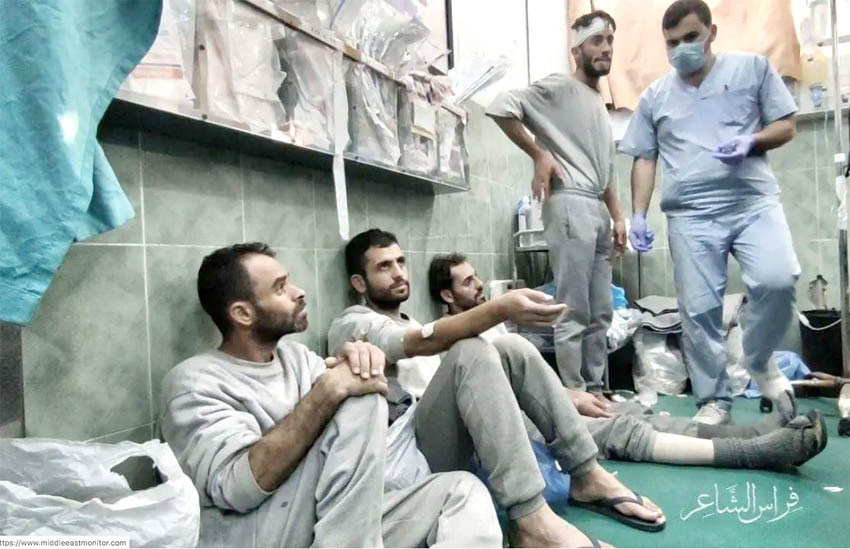
ON THURSDAY, Israeli authorities released 64 detainees from Gaza. Among the released were two women from Gaza, detained while accompanying patients in Israel. Of the freed detainees, 22 went directly to the hospital, while the rest sought their families.
When Ibrahim Salem stepped out of the ambulance at Al-Aqsa Hospital in Deir al-Balah, he was immediately surrounded by anxious locals desperate for news of missing loved ones.
They bombarded him with questions about people who had vanished or been captured by Israeli forces during the recent ground invasion of Gaza.
‘Have you seen so-and-so? How is he? Did you come across the name of so-and-so?’, were some of the urgent queries as reports surfaced that many Palestinian detainees had been tortured and killed in Israeli prisons and camps.
The latest victim was Islam Al-Sarsawi, 42, from Gaza’s Shujaiya neighbourhood, who died under torture at the Sdeh Teyman camp following his arrest during a raid on Al-Shifa Hospital.
Salem recounted the severe torture he endured at the hands of Israeli soldiers. ‘They tortured me with an electric chair, beat me severely, and broke my ribs,’ he revealed, showing scars on his chest. Torture sessions would last for days and weeks, he said. During his imprisonment, a fellow detainee died from the abuse, sparking a protest that guards brutally suppressed.
According to the Palestinian Prisoners Affairs Authority and the Palestinian Prisoners Society, the number of martyrs from the prisoner movement since 1967 has reached 257, including 20 who have died since the beginning of the current genocidal war. Many identities remain concealed by the occupation forces.
Salem described his arrest and subsequent torture, explaining that soldiers took him to an unknown location before transferring him to the Negev desert prison. Conditions there were dire, with many prisoners suffering from scabies due to filthy bedding. ‘Scabies, hunger, thirst, and no medical care; most have lost half or a third of their weight,’ Salem noted.
He further detailed the inhumane treatment, including the use of dogs to intimidate prisoners and inadequate food supplies. ‘Small slices of bread, filthy bedding that can’t be washed, no medical care or medicine,’ he lamented.
Upon his release, Salem arrived at the hospital exhausted and emaciated. He sat outside on a bench, surrounded by neighbours and relatives displaced from northern Gaza, who continued to question him.
His spirits briefly lifted when a neighbour contacted his father, Atef, who had refused to evacuate northern Gaza.
However, his joy was short-lived when he received a call from his brother Waseem in Turkey, informing him that their brother Laith had been killed while rescuing neighbours from an Israeli airstrike.
As Salem and his companions headed to an unknown destination, he asked, ‘Where are we? Where do we go? I want to return to my children and family in northern Gaza.’ His guides explained that returning north was impossible and that they were now in the central strip. They took him to a tent in the Mawasi area west of Khan Younis, deemed ‘safe’ by the occupation but subjected to multiple airstrikes, resulting in numerous casualties.